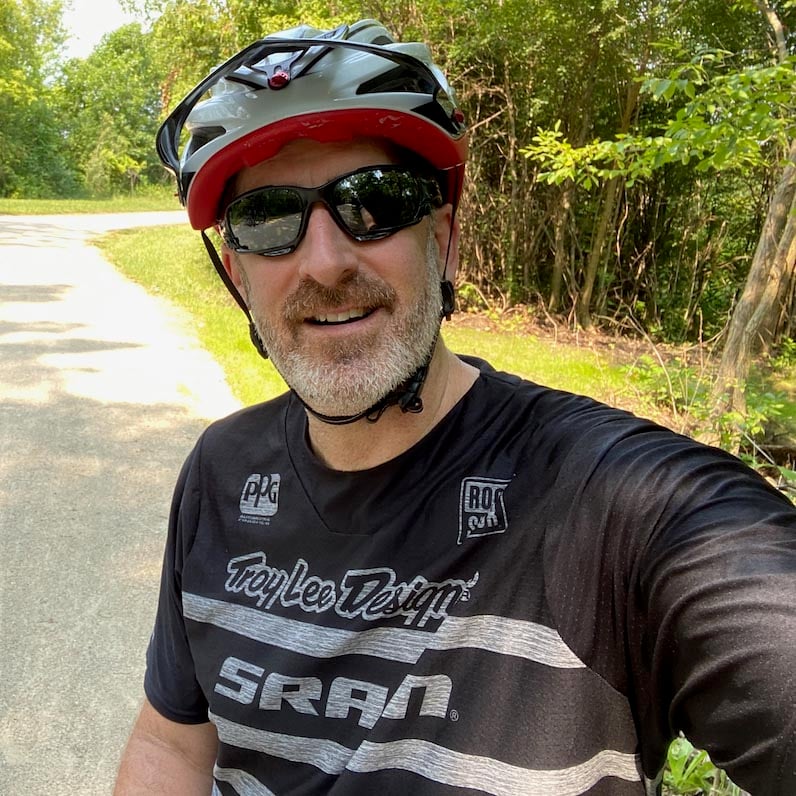Edited for content and clarity by Chris H. Hadgis
In 1987, Stan Day’s invention of the Grip Shift, or the bike gear twist, “changed the world.” Since then, the company now known as SRAM has grown, adapted, and acquired 14 additional brands along the way.
Soon-to-be former VP of Marketing at SRAM, David Zimberoff (DZ), earned a highly-unique departure gift: he got to select the replacement for his role at SRAM to pursue his dream of designing a low-cost, sustainable, mobility solution for rural communities.
DZ highlights the importance of leaders understanding what’s happening at all levels and said he can only do so from the field. So, this fall, his year-long, fully-SRAM-funded mission begins.
DZ’s travels will start in the established communities and locations of SRAM’s non-profit sister company, World Bicycle Relief. The design of his intended solution depends on what he finds. He aims to make connections, meet people who need affordable, reliable transportation, and identify what specific problems exist.
For now, the solution looks like a solar-powered e-bike. But maybe not. He’s open and humble enough if proven wrong to discover and innovate new ideas.
In our latest Industry Expert Interview, we were fortunate to catch up with DZ about his 30 years at SRAM before he departs on this new endeavor.
KSV: What are some of the most successful marketing strategies SRAM has employed over the past 20 years to get the brand to where it is today?
DZ: My counterpart at Scott Bikes in Europe is named Reto. Reto and I grew up in the bike industry. We were at the Eurobike Show in Frankfurt, and we were having lunch when he said, "What's the key to success here? You've had a big run. What is it?" The first word that jumped to my mind was creativity.
Creativity is super important because that's how you get people's attention. If you look at SRAM's track record, one of our critical successes has been the unique things we've done either physically, through words, or through product design and innovation.
The second word that jumped out was consistency. The “one-hit wonder" musician is innovative and creative, but not consistent. They're able to have one great song but not another. We've been able to have repeat success year after year. Consistency is crucial. One of the greatest textbook lines I've read and remembered is, "Great brands are built through repetition over time." If you're just a one-hit wonder, you're not going to build a great brand.
The third was culture. And what I mean by culture isn't the people, but being authentic to a culture or building a culture that's authentic to the sport or the category of people that you're talking to. And so, the best strategy is to be creative, consistent, and culturally appropriate.
KSV: What’s the biggest barrier SRAM faced in developing the brand and staying competitive as the market evolved?
DZ: Three: the biggest one is innovation. The company Specialized, unfortunately, coined the phrase, "Innovate or die," which I love. I wish we'd come up with it first. Our sport and the bike industry loves new gear. That's what fuels us – cool new tech gear that advances the way you use bikes. So, if you're not innovative, that’s the main challenge. Beyond people, it's innovation.
Number two is acceptance. You can create a new widget, but if it's not the right time, or if it doesn't serve the market's needs, getting it into the market is tough.
The last one is quality. Quality is extremely hard. Customers expect things to work and not break unless we break it ourselves. When you're making just a few things, it's easy. But when your supply chain's all over the world and you've got a hundred people on the assembly line making tens of thousands or millions of things, quality is a lot harder. So, to stay competitive and at the top, your quality's got to be great, or customers bail. Our culture today too is such an instantaneous gratification, Twitter, Instagram, I want what I want when I want it, and I want it now. You’ve got to be great, out of the box.
KSV: How has SRAM viewed the development of technology in enabling the advancement of how it can serve customers?
DZ: Technology for us is cool. Our components have migrated from being mechanical to electromechanical and internet-enabled or connected. So what we've done is we have taken a look at what a connected component can do to serve customers and we've taken it to the highest possible levels. We have a huge amount of data coming back from users now: how they ride, how fast they ride, how they shift, how many times they shift, what gear they shift mostly in, what gear they shift mostly in, and in what terrain.
Because our components are connected and people are opting to share their data with us, it helps us make our products better. We have a handshake with the customer and we get feedback electronically. So we utilize technology to simply make our products better.
KSV: Neat analogy: a handshake, a digital handshake.
DZ: If you agree to give it to us.
KSV: Right.
KSV: How does SRAM balance technology and the human aspects of innovation?
DZ: When SRAM first invented Grip Shift, the competitor at the time, Shimano made a shifter also. When we took apart their shifter it was made of 70 pieces. Our shifter had seven.
We used technology – manufacturing technology and innovation – to make something simple to do the same thing. The only thing a shifter does is pull and release the cable. That's the sole job of a shifter. In turn, it moves the derailleur and the derailleur changes the gears. The advertising headline we came up with when we first launched Grip Shift, before my days, was Simply Superior. The word simply had two meanings. One, it was a simple piece, it had fewer parts, and it was simply superior, better.
That philosophy has straddled everything we do. We try to do something that adds more value and makes the ride better and enhances the riding experience more simply. Generally, the simpler you make something, the easier it is to make, the easier it is to repair, the cheaper it is to make.
KSV: Easier to maintain quality, I imagine.
DZ: Yeah. Fewer pieces to go wrong. Quality. So simply superior is the balance between technology and human needs to add value to innovation.
KSV: What strategies does SRAM employ to help make customers feel seen, heard, and included?
DZ: Years ago, our VP of Sales John Nedeau was thinking about this exact question when he met a consulting partner who teaches a methodology called value selling. Value selling is a concept in sales where you identify your customer’s needs and solve them by illustrating how valuable you can be in all those different areas.
So, that's our tactic. Instead of going to a customer and saying, "Here's this new bike part, here's how much it costs, would you like to buy it?" We say, "Tell us some of your biggest challenges. Or tell us about the new categories of cycling that you're interested in and what are some of the barriers that you're discovering."
Flip the table, and get customers talking about themselves and their problems. Then you can say, "You know what? The other day when you were telling me about this and this, this is what I think I heard, and this is a possible solution that we have for you." Value selling is where it's at for us.
KSV: What are some of the things you’re most proud of accomplishing as a VP & CMO over the past 24-plus years as you start your next chapter?
DZ: There have been a million campaigns and a million fun things that we've done. I could single some of them out but what I'm most proud of are creativity, consistency, and culture and hitting those year after year.
I'm also most proud of building a successful and creative team. I am super proud of being able to walk away confident that they're going to keep it up.
The body of work, the legacy, is what I'm most excited about and proud of. Our founder and former president, now chairman of the board, Stan, said something simple but meaningful to me, "Dave, thanks for helping us be cool for so long."
KSV: Does SRAM have goals for sustainability? If so, what are they?
DZ: Yes, we do. At the highest level, we group sustainability and corporate social responsibility into one big bucket. Sustainability is one silo in corporate social responsibility. We have a policy, we have strategies. We are hyper-focused on the recyclability of our products and the materials and the supply chain. We manufacture most of our stuff. We control what we do in terms of the kind of fumes and toxins used. And we’re refining a goal of trying to be carbon-zero or net-neutral.
The good news, too, and one of the things we love about CSR and sustainability at the highest level: we make bike parts for human-powered transportation. Now, we're slowly adding to electric transportation, but we're not making parts for fossil fuel-based transportation.
We love where we are. We can just get better at it.
KSV: I see what you're saying. Hopefully, the result is fewer cars, more bikes, and less pollution. But how you arrive at those goals matters – sustainably or not.
DZ: Totally. There's still a ton of opportunity. But at the end of the day, we're in the correct category.
KSV: As a CMO for over 20 years, what advice would you give to your less-experienced self?
DZ: Repeat more of the great plays. We're so quick to move on and do something new. We're always doing new, cool, fun stuff. But rarely do we step back and say, "Wait a minute, what's the one thing we did that's great and effective? Let's keep doing that." Why stop for something new? Keep doing more of the things that are already working and already successful. Or, if you have a great play, run that same play in more areas of the brand or the business. You don't always have to do something new.
Like in the baseball movie “Moneyball” – hit singles all day. Every once in a while hit a home run for a big explosion. But if you focus on hitting singles all day, you're going to win a lot and succeed.
Lastly, the number one most valuable commodity in the world: Time. I would tell my less-experienced self, "Be selfless and spend more time with your team. Give them as much as you can."
